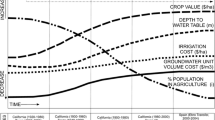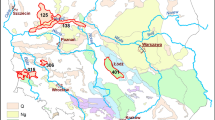Abstract
In many arid and semiarid areas, as is the case of south-eastern Spain and the Canary Islands, water is scarce but highly demanded for irrigation of cash crop and for supply to urban and tourist areas. Generally, water quantity dominates over water quality issues. Surface water resources are scarce. So, in south-eastern Spain, out of the area of influence of the permanent Segura River, and in the Canary Islands, groundwater is often the main or the only reliable natural water resource. As a consequence, aquifers are often intensively exploited and some of them subjected to continuous depletion of their reserves (groundwater mining). In south-eastern Spain, the cumulative groundwater reserve depletion is about 15 km3. In Gran Canaria and Tenerife Islands it is about 2 km3. The current rate of depletion is 0.3 to 0.4 km3/year. Although obtaining groundwater is expensive, in most cases it is still cheaper than desalinated and/or reclaimed waste water made available at the place of use when full costs are considered. Environmental damage is not evaluated. Groundwater intensive use and mining have been and still are the drivers of economic and social development. According to European and Spanish legal regulations, the current situation is not acceptable. To address problems, good governance and a change in the water use paradigm are needed. Solutions depend largely on controlling water use and on demand management. As this is administratively difficult and politically unpalatable, most action is currently directed to increase the public offer of water through import from outside—if it is possible—seawater desalination and wastewater reuse, but at subsidized prices (tariffs). This is economically, politically and environmentally questionable, and an economic distortion which delays the change, deters private investment in groundwater, and needs continuous public funding. In the case of the Canary Islands, this also disturbs groundwater markets. What is presented also happens in other world areas. It is not new and does not involve research but summarizes a long and documented experience and solution attempts that are of relevance to evaluate and address problems elsewhere.
Similar content being viewed by others
Change history
25 September 2017
The original article has erroneously been published in volume 3, issue 3. The article belongs to the special issue on Sustainable Resource Management: Water Practice Issues.
25 September 2017
The original article has erroneously been published in volume 3, issue 3. The article belongs to the special issue on Sustainable Resource Management: Water Practice Issues.
References
Connor JD, Kaczan D (2013) Principles for economically efficient and environmentally sustainable water markets: the Australia experience. In: Schwabe K, Albiac J, Connor J, Hassan R, Meza L (eds.) Drought in arid and semi-arid environments: a multi-disciplinary and cross-country perspective. Springer, Dordrecht 20, pp 357–374
Custodio E (2002) Aquifer overexploitation, what does it mean? Hydrogeol J 10(2): 254–277
Custodio E (2012) Intensive groundwater development: a water cycle transformation, a social revolution, a management challenge. In: Martínez–Cortina L, Garrido A, López–Gunn E (eds) Rethinking water and food security. CRC Press/Balkema, Taylor & Francis, Boca Raton, pp 259–298
Custodio E, Cabrera MC (2013). The Canary Islands. In: De Stefano L, Llamas MR (eds). Water, agriculture and the environment in Spain, can we square the circle? CRC Press/Balkema, Taylor & Francis, Boca Raton, pp 281–290
Custodio E, Andreu-Rodes JM, Aragón R, Estrela T, Ferrer J, García-Aróstegui JL, Manzano M, Rodríguez L, Sahuquillo A, del Villar A (2016b) Groundwater intensive use and mining in south-eastern peninsular Spain: hydrogeological, economic and social aspects. Sci Total Environ 559:302–316
Dumont A (2015) Flows, footprints and values: visions and decisions on groundwater in Spain. Doctoral Thesis, Complutense University of Madrid: 1–310
Foster SSD (1993) Unsustainable development and irrational exploitation of groundwater resources in developing nations: an overview. In: Aquifer Overexploitation. International Association of Hydrogeologists, Selected Papers 3, Heise: 385–402
Foster SSD, Loucks DP (2011) Non–renewable groundwater resources: a guide book on socially–sustainable management for water–policy makers. IHP–VI Series in Groundwater 10, UNESCO/IAH/GW–State Word Bank, Paris, pp 1–103
Konikow LF, Leake SA (2014) Depletion and capture: revisiting the source of water derived from wells. Ground Water 52(1):100–111
Llamas MR, Martínez–Cortina L, Mukherji A (2009) Water ethics. CRC Press/Balkema, Taylor & Francis, Boca Raton, pp 1–368
Margat J, van der Gun J (2013) Groundwater around the world: a geographic synopsis. UNESCO–PHI/IGRAC/CRC Press, Paris, pp 1–376
MASE (2015) Hydrological, environmental, economic, social and ethical aspects of groundwater reserve consumption in Spain: groundwater mining in Spain. Custodio E (ed.) UPC and SUEZ Advanced Solutions (AQUALOGY)-Cetaqua, Barcelona: 1–490. http://h2ogeo.upc.edu/es/proyectos-empresa-ghs#d%C3%A9cada-2010. Accessed 20 Mar 2017
Molinero J, Custodio E, Sahuquillo A, Llamas MR (2011) Groundwater in Spain: Legal framework and management issues. In: Findikakis, Sato (eds.), Groundwater management practices. CRC Press/Balkema, Boca Raton, pp 123–137
Moreu JL (2009) Historical evolution and current statal regulations on groundwater. Revista Crítica de Derecho Inmobiliario 714:1769–1897
Richey AS, Thomas BF, Lo MH, Reager JT, Famigliettti, JS, Voss K, Swenson S, Rodell M (2015) Quantifying renewable groundwater stress with GRACE. Water Resour Res 51(7):5217–5238
Wada Y, van Beek E, van Kempen C, Reckman J, Vasak S, Binkens M (2010) Global depletion of groundwater resources. Geophys Res Lett 37:1–5
Wada Y, van Beek LPH, Bierkens FF (2012) Non-sustainable groundwater sustaining irrigation: a global assessment. Water Resour Res 48:W00L6. doi:10.1029/2011/WR010562
Werner AD, Zhang Q, Xue L, Smerdon BD, Li X, Zhu X, Yu L, Li L (2013) An initial inventory and indexation of groundwater mega–depletion cases. Water Resour Manag 27:507–533
Acknowledgements
The MASE Project (Groundwater Mining in Spain) has been carried out by the Department of Geo-Engineering of the Technical University of Catalonia (UPC), with the economic support of SUEZ Advanced Solutions (AQUALOGY) and the guidance of Cetaqua. Many local, regional and national experts and university professors have voluntarily contributed to the project, as well as some institutions. All of them are credited in MASE (2015).
Author information
Authors and Affiliations
Corresponding author
Additional information
For a special issue of Sustainable Water Resources Management (SWRM), Springer (http://www.springer.com/earth+sciences+and+geography/hydrogeology/journal/40899).
Rights and permissions
About this article
Cite this article
Custodio, E., Albiac, J., Cermerón, M. et al. Groundwater mining: benefits, problems and consequences in Spain. Sustain. Water Resour. Manag. 3, 213–226 (2017). https://doi.org/10.1007/s40899-017-0099-2
Received:
Accepted:
Published:
Issue Date:
DOI: https://doi.org/10.1007/s40899-017-0099-2









